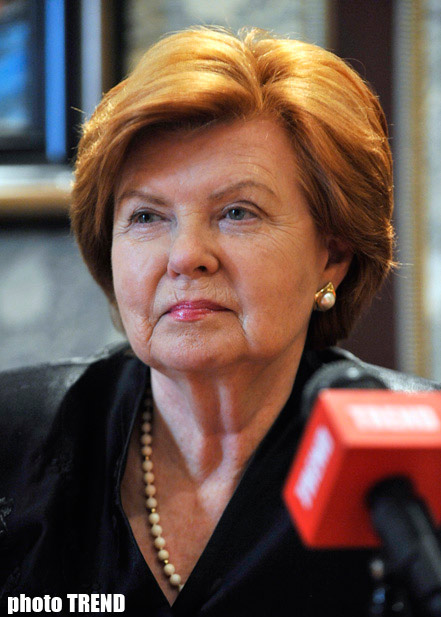Azerbaijan, Baku, Sept. 17 / Trend V.Zhavoronkova /
Trend interviewed Mrs. Vaira Vike-Freiberga, Former Latvian President, Special Envoy to the U.N. Secretary General, Vice Chairman of the Group of Experts on EU Long-Term Development.
Trend: How do you asses your recent visit to Azerbaijan? How has the country changed since your last visit?
Vike-Freiberga: I could see how rapid the changes have been in Azerbaijan in the last five years, it is visible to the naked eye. Your country is growing and taking advantage of its natural resources as well as looking after its human resources. My husband and I have been to a number of institutions dealing with higher learning and science and technology and it is clear that Azerbaijan is moving in that area very vigorously and very rapidly.
I think that it is very wise and you have been very fortunate in having an extremely intense period of high oil prices which have gone into building up your country's reserves, because the natural resources are something that can not be relied on to provide prosperity for ever and ever. The fossil fuels by definition will be exhausted at some point, but even before that the oil prices fluctuate so widely that every country-exporter need[s] to provide the cushions for these reserves. So I think that you are very wise to have looked to the future generations and to start building ... capital of a different sort for them to enjoy better incomes. I think your human, of course, capital is your best investment because is renewable capital, a renewable resource.
Q.: You recently proposed creating a U.N. special representative for the Nagorno-Karabakh conflict. Would this positively impact the process of finding a peaceful resolution to the conflict?
A.: If it is a question of the UN then some member countries of the UN would have to make such a proposal and then they would have to get a sufficient number of countries to agree to it. I must confess that the length of time it has taken ... the so-called Minsk Group to try to come to an agreement and quite evidently without success it, seems to me ... an argument for looking to a different group of negotiators who might have better chance of obtaining the resolution. Because, I think negotiations are an art, not a science. The OSCE Minsk Group insists on participation in the negotiating process, but without any results. Maybe it would be a good idea and good reason to try to get a new team. Now, of course, the old team's members should agree to step down to get a new team and I have serious doubts ... that they would be ready to do it.
Q.: How do you asses Azerbaijan's role in terms of European energy security?
A.: I would say that Azerbaijan is located geographically at a very strategic point, where it could serve as a bridge for both oil and gas transportation from, for example, the Central Asian countries and of course it is itself also a source of fossil fuel energy. The country can provide alternative routes of providing both gas and oil to Europe. Europe needs to have a common energy policy, but this common energy policy means the need to diversify sources of energy.
Q.: You are also a vice chairman of the Group of Experts on EU Long-Term Development. How can the EU help to stabilize the region given its immense Caspian energy resources?
A.: On the one hand, the EU can contribute to stabilization through participation in alternative routes of energy supply, investment in pipelines and delivering on these routes. I think that the idea of having liquid gas terminals in this region is good, because the liquid gas can be transported more easily than the gas in its gaseous form. At a different level - at a political level, of course one would like to see this region gradually solve the frozen conflicts that are in place and to solidify the democratic processes and structures and, of course, develop societies that can enjoy growth and development and prosperity as much as Western Europe can. We in Latvia, who were a part of the Soviet Union as much as Azerbaijan was, sympathize, particularly with your striving to catch up with us.
Do you have any feedback? Contact our journalist at: [email protected]






